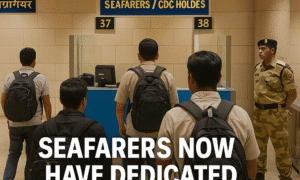The shipping industry is the silent engine of globalization—carrying over 90% of world trade across oceans. It’s often said that if shipping were to stop, half the world would go hungry.
Yet, amid this undeniable importance, one vital element remains neglected: convenient access to ports for seafarers.
🚢 Not All Ports Are Equal
While ships can trade anywhere, crew relief, stores, and spares don’t enjoy the same flexibility. For a seafarer awaiting sign-off or expecting fresh provisions or critical machinery parts, only a handful of ports around the world are considered “convenient.” But why should that be the case in an era of global connectivity?
✈️ The Flight, Visa & Bureaucracy Barrier
Some regions like South America, parts of Africa, and Indonesia are often skipped for crew changes simply because of high visa fees, complex immigration rules, or expensive flights. Even some European ports are avoided due to logistical or cost reasons. The result? Crew members are asked to “wait for the next port”—a next port that might be weeks, even months away.
What starts as a 6-month contract often stretches into 8 or 9, simply because arranging relief at a “cheaper port” is easier on the company’s pocket.
⚙️ Spares & Stores: Still a Struggle
The situation is no better when it comes to stores or critical spare parts. Many African ports, for instance, struggle with availability of technical services. I recall once when our gyrocompass was due for annual servicing—we reminded the office several times, yet no service technician was arranged.
Only when the gyro failed six months later—at anchorage—did the company finally act. Thankfully, we were not sailing in heavy traffic when it happened.
🧭 A Global Workforce With Local Problems
Seafarers are global workers. They navigate international waters, abide by global regulations, and transport cargo for multinational corporations. So why do they have to deal with localized red tape, arbitrary port restrictions, and penny-pinching delays?
If we can track a parcel from warehouse to doorstep across continents, surely we can build a system that supports efficient crew changes and spare deliveries worldwide.
🛑 Time for Institutions to Intervene
Organizations like IMO (International Maritime Organization), ILO (International Labour Organization), and ISF (International Shipping Federation) must step up. There needs to be a global resolution that ensures:
- Every major trading port designates proper facilities for crew relief and service access
- A standard set of immigration and visa protocols for seafarers
- Encouragement of international cooperation to ease cost burdens on companies
- Penalties for unreasonable delay in crew sign-offs or technical servicing
⚓ Let’s Not Forget the Human Element
Seafarers keep the world running—quietly and without complaint. But that doesn’t mean they should be ignored. Behind every delayed sign-off or missed spare delivery is a tired worker missing home, or a potential safety hazard building up.
Let’s make every port a seafarer-friendly port. Because when we ease life for those at sea, we make the entire industry—and the world—a more resilient place.
The author is a Chief Officer sailing on merchant ships with years of experience navigating oceans and handling real-life challenges at sea. He writes from firsthand experience—sharing the ups, downs, and everything in between that comes with life onboard. Through his writing, he hopes to give a voice to fellow seafarers and spark change where it’s long overdue.
Have something to share?
If you’re a seafarer with a story or suggestion, contribute to shippys.org. Anonymous entries are welcome. Let your voice be heard.
👉 Contribute now and be a voice for the community.
For more information, click here.
#SeafarersMatter #ShippingLife #CrewChangeCrisis #MaritimeSafety #ConvenientPorts #GlobalTrade




Leave a comment